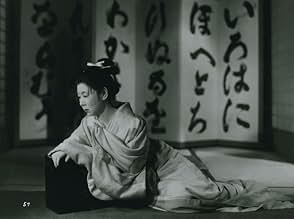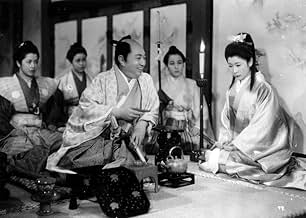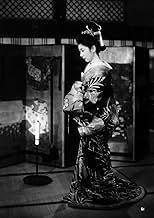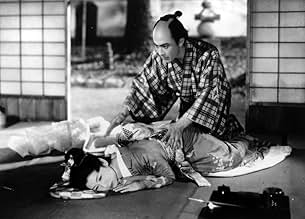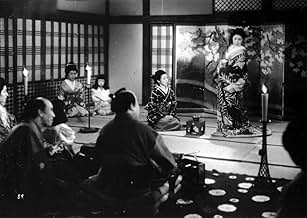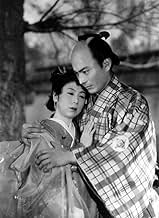AVALIAÇÃO DA IMDb
8,1/10
8,1 mil
SUA AVALIAÇÃO
Segue a luta e sobrevivência de uma mulher em meio às vicissitudes da vida e a crueldade da sociedade.Segue a luta e sobrevivência de uma mulher em meio às vicissitudes da vida e a crueldade da sociedade.Segue a luta e sobrevivência de uma mulher em meio às vicissitudes da vida e a crueldade da sociedade.
- Direção
- Roteiristas
- Artistas
- Prêmios
- 2 vitórias e 1 indicação no total
Akira Oizumi
- Manager Bunkichi
- (as Hiroshi Oizumi)
- Direção
- Roteiristas
- Elenco e equipe completos
- Produção, bilheteria e muito mais no IMDbPro
Avaliações em destaque
I finally saw Life of Oharu at the Ontario Cinematheque in Toronto last night and what an amazing film it was.
I don't know why I held out on Mizoguchi for so long. I think it's because I watched a lot of Ozu in the day and expected more of the same heavily restrained, obliquely symbolic style which is often as alienating as it is inventive. I couldn't have been further off the mark. Mizoguchi's style is fluid and assured like Hitchcock and Bresson. He also injects a warmth of spirit and shows a genuine interest in storytelling which is often absent in much of Ozu's ouevre.
The Story of Oharu is a treatise on how women are economically exploited in a patriarchal society. This is probably one of the greatest 'women's films' ever made. It ranks above 'Breaking The Waves' and Sirk's 'Imitation of Life'. No small feat!! If you like stories that actually say something about the world in which we live, I would strongly recommend this film. It's a masterpiece of world cinema. I am definitely going to see more Mizoguchi.
I don't know why I held out on Mizoguchi for so long. I think it's because I watched a lot of Ozu in the day and expected more of the same heavily restrained, obliquely symbolic style which is often as alienating as it is inventive. I couldn't have been further off the mark. Mizoguchi's style is fluid and assured like Hitchcock and Bresson. He also injects a warmth of spirit and shows a genuine interest in storytelling which is often absent in much of Ozu's ouevre.
The Story of Oharu is a treatise on how women are economically exploited in a patriarchal society. This is probably one of the greatest 'women's films' ever made. It ranks above 'Breaking The Waves' and Sirk's 'Imitation of Life'. No small feat!! If you like stories that actually say something about the world in which we live, I would strongly recommend this film. It's a masterpiece of world cinema. I am definitely going to see more Mizoguchi.
10rbiko-1
I cannot agree with the reviewer who commented that Mizoguchi does not have the aesthetic sensibility of Kurosawa or Ozu. In fact, he appears to me to be the true master of Japanese cinema. 'Oharu' is a marvellous achievement - a compassionate, beautiful account of a quite astonishing fall from privilege and grace into destitution and despair. It is unremittingly bleak and yet due to Mizoguchi's genius and Kinuyo Tanaka's luminous portrayal of the unlucky Oharu, it is a spiritually compelling work, with sheer artistry and simple human empathy competing for our attention in every take. Breathtaking film-making of the highest quality.
'The Life of Oharu' is not an easy film to watch. There is barely even a fleeting moment of joy/happiness and towards the end, the viewer will find himself/herself getting really angry and outraged by the unthinkable oppression and atrocities and engulf our titular protagonist. Mizoguchi's sympathetic treatment of Oharu compels the viewer to feel beaten down and horrified by Oharu's miserable plight.
The long line of tragedies in Oharu's life gets triggered by her decision to fall in love with Katsunosuke(played by the legendary Toshirô Mifune), a man of lower social standing. This element of forbidden love was also present in the previous Mizoguchi film that I watched namely 'The Story of Last Chrysanthemum'. The story arc of Otoku in that film to a some extent resembles the arc of Oharu in this one in terms of the mental and physical torture that they are both subjected to. Oharu makes an effort to conform to society's deplorable expectations, but even then gets nothing to show for it and gets discarded. This is because once she falls in social standing and gets sold off by her family, she ceases to be a human being in the eyes of society. There is a lot of references to trade and business in 'The Life of Oharu' which is relevant because Oharu over the course of her life becomes nothing more than a commodity to be sold from one customer to the next in the patriarchal society of 17th century Japan.
Mizoguchi technical mastery is again on show in 'The Life of Oharu'. Some of the long takes and extended tracking shots are truly remarkable. Mizoguchi had the ability to suggest a plethora of things like passage of time, a change in mood, etc. with one little pan movement of the camera or with just the camera placement and those features are on show here too. The interior sets are beautifully designed and the haunting music by Ichirō Saitō is used craftily from time to time to set/change the mood. Kinuyo Tanaka has to be admired for lending the sympathy inducing tender innocence to Oharu. Her performance in the scenes depicting the later stages of Oharu's life is jaw-dropping in its authenticity and humanity.
To conclude, I have to reiterate that 'The Life of Oharu' is not for everyone. One has to be in a specific mood to be able to endure the emotionally crushing narrative and storytelling of the film. But having said that, I still believe that it needs to be watched as Oharu represents numerous women(of Japan and beyond) in history and present times whose lives were and are still getting destroyed due to an oppressive society which denigrates women. It is said that Mizoguchi's obsession with capturing the misery of women in the face of oppression had its roots in his own childhood as his own sister who raised him was sold by their father. One can sense a personal grief, a personal intimacy in the style of storytelling in this particular film. Highly Recommended.
The long line of tragedies in Oharu's life gets triggered by her decision to fall in love with Katsunosuke(played by the legendary Toshirô Mifune), a man of lower social standing. This element of forbidden love was also present in the previous Mizoguchi film that I watched namely 'The Story of Last Chrysanthemum'. The story arc of Otoku in that film to a some extent resembles the arc of Oharu in this one in terms of the mental and physical torture that they are both subjected to. Oharu makes an effort to conform to society's deplorable expectations, but even then gets nothing to show for it and gets discarded. This is because once she falls in social standing and gets sold off by her family, she ceases to be a human being in the eyes of society. There is a lot of references to trade and business in 'The Life of Oharu' which is relevant because Oharu over the course of her life becomes nothing more than a commodity to be sold from one customer to the next in the patriarchal society of 17th century Japan.
Mizoguchi technical mastery is again on show in 'The Life of Oharu'. Some of the long takes and extended tracking shots are truly remarkable. Mizoguchi had the ability to suggest a plethora of things like passage of time, a change in mood, etc. with one little pan movement of the camera or with just the camera placement and those features are on show here too. The interior sets are beautifully designed and the haunting music by Ichirō Saitō is used craftily from time to time to set/change the mood. Kinuyo Tanaka has to be admired for lending the sympathy inducing tender innocence to Oharu. Her performance in the scenes depicting the later stages of Oharu's life is jaw-dropping in its authenticity and humanity.
To conclude, I have to reiterate that 'The Life of Oharu' is not for everyone. One has to be in a specific mood to be able to endure the emotionally crushing narrative and storytelling of the film. But having said that, I still believe that it needs to be watched as Oharu represents numerous women(of Japan and beyond) in history and present times whose lives were and are still getting destroyed due to an oppressive society which denigrates women. It is said that Mizoguchi's obsession with capturing the misery of women in the face of oppression had its roots in his own childhood as his own sister who raised him was sold by their father. One can sense a personal grief, a personal intimacy in the style of storytelling in this particular film. Highly Recommended.
Deeply tragic and sad tale that is nevertheless presented to us with great dignity and style. A tale of the harshness of feudal Japan and the way the men treat the women is unfortunately not without its echo, even today in that great country. A woman here, originally of noble beginnings, makes bad, then good, then more and more bad and none of it of her making. She is simply the result in men's dealings and hypocrisies. Still beautiful to look at though with the magical camera-work and immaculate direction. Some slight confusions at first until we realise that time jumps at the blink of an eye and before we know it one period has slid effortlessly into another, where inevitably another tragedy awaits our fallen heroine.
Mizoguchi's empathy for female characters is legendary. The Life of Oharu is one outstanding example. One woman's journey from member of the imperial court to elderly streetwalker is narrated in exquisite, shimmering, painful style. Oharu (Kinuyo Tanaka) is seduced by a man below her station. Her crime is to love the man back unreservedly. That action becomes the catalyst for a series of degradations punctuated by false dawns, as Oharu's life spirals to rock bottom. And as bleak and depressing as that sounds, Mizoguchi's storytelling, combined with Tanaka's dignified portrayal, make this film cathartic, a tragedy with a small, life-affirming message at its heart. It is a cautionary tale to the follies of social mores, and the burden that women through the ages have to endure. More than that, it is a tale of one woman's dignity through the most humiliating of circumstances. Stunning.
Você sabia?
- CuriosidadesThis film, which was director Kenji Mizoguchi's dream project, was severely under-financed, and the production was forced to use a warehouse instead of a regular sound stage. This warehouse happened to be located near railways, and each time a train passed by, they had to stop shooting, which made the shooting of the film even more difficult with the director's obsessive use of long, continuous, uninterrupted takes. The same warehouse was also used for Josef Von Sternberg's film 'The Saga of Anatahan'.
- Citações
Katsunosuke: Lady Oharu, a human being - no, woman - can only be happy if she marries for love. Rank and money don't mean happiness.
- Cenas durante ou pós-créditosOpening credits shown over Japanese artwork/water-colors.
- ConexõesFeatured in Écoute voir... (1978)
Principais escolhas
Faça login para avaliar e ver a lista de recomendações personalizadas
- How long is The Life of Oharu?Fornecido pela Alexa
Detalhes
Bilheteria
- Faturamento bruto mundial
- US$ 6.921
- Tempo de duração
- 2 h 28 min(148 min)
- Cor
- Mixagem de som
- Proporção
- 1.37 : 1
Contribua para esta página
Sugerir uma alteração ou adicionar conteúdo ausente

